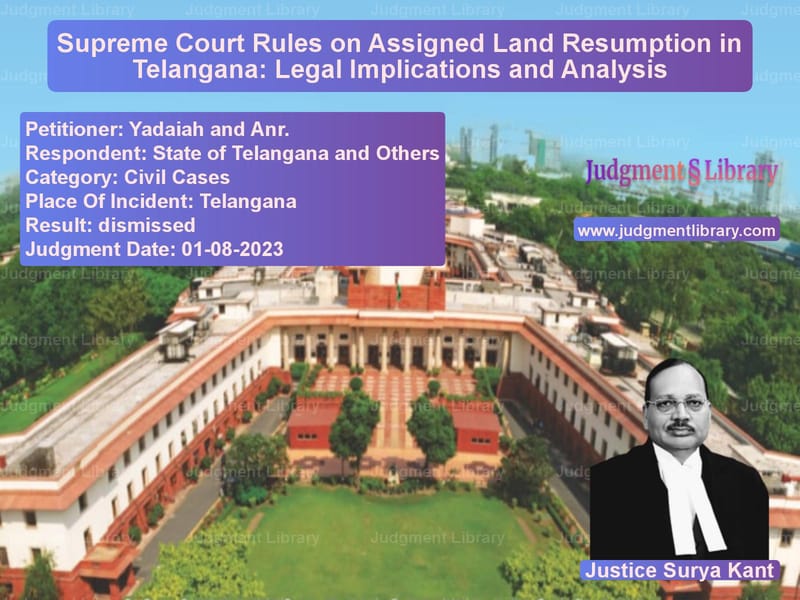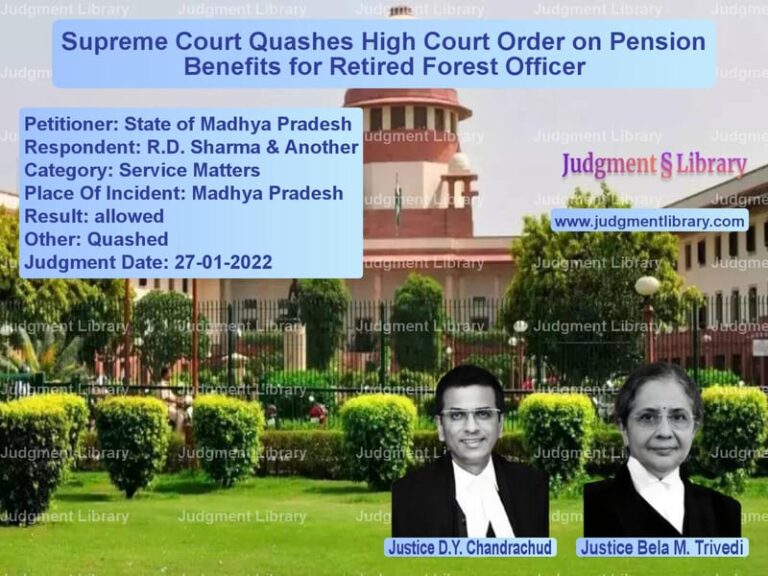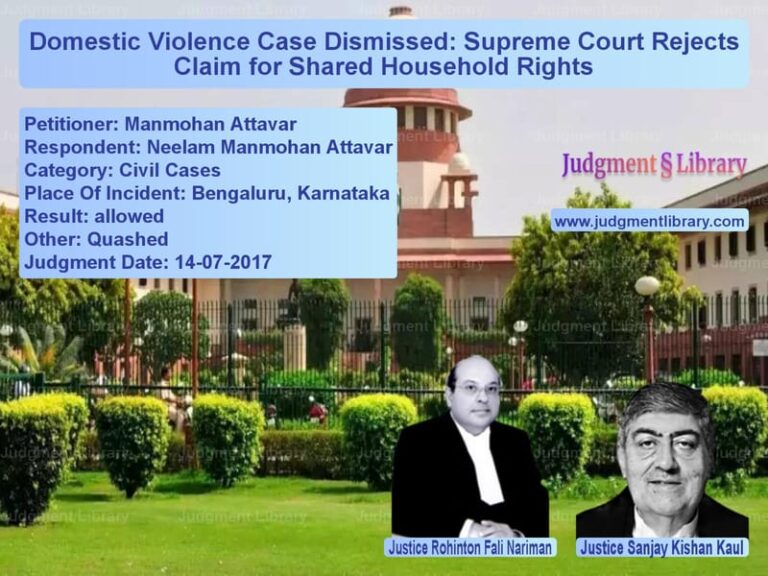Supreme Court Rules on Assigned Land Resumption in Telangana: Legal Implications and Analysis
The Supreme Court of India recently rendered a landmark decision in the case of Yadaiah and Anr. vs. State of Telangana and Others, dealing with the resumption of assigned land that had been originally allocated for agricultural purposes to landless beneficiaries, particularly from the Scheduled Caste (SC) and Scheduled Tribe (ST) communities. The case highlights significant legal issues surrounding land alienation restrictions, the validity of assignments, and the application of the Andhra Pradesh Assigned Lands (Prohibition of Transfers) Act, 1977 (hereinafter referred to as the 1977 Act).
This case has been through multiple rounds of litigation, making it a crucial precedent for property disputes involving assigned lands. The Supreme Court’s ruling clarifies the limitations on alienation, the rights of government authorities to resume land in cases of unauthorized transfers, and the principles governing land assignment policies.
Background of the Case
The dispute dates back to the 1950s when the government assigned approximately 200 acres of land to landless individuals under the ‘Astabl Kanchi’ policy, aiming to promote agricultural development and uplift economically weaker sections. The assigned lands were granted with clear restrictions prohibiting alienation.
The following key events led to the legal dispute:
- In 1953, the government of Andhra Pradesh (now Telangana) issued land allotments to individuals under its assignment scheme.
- By 1961, the government converted the temporary pattas into permanent pattas, reinforcing the condition that the land was meant solely for agricultural use by the assignees.
- In 1992, several assignees executed General Power of Attorneys (GPAs) in favor of one M.A. Baksh, a real estate developer who subsequently transferred portions of the land to third parties.
- The government initiated an investigation upon noticing that the land was being used for non-agricultural purposes.
- Authorities invoked provisions of the 1977 Act, declaring that the transfers were illegal and initiated proceedings to resume possession.
The petitioners, who were either successors or purchasers of the land, challenged the government’s decision in court, leading to a protracted legal battle.
Legal Issues Involved
The Supreme Court had to determine:
- Whether the assigned lands could be transferred despite explicit alienation restrictions.
- Whether the government’s action of resuming land was legally justified under the 1977 Act.
- Whether the doctrine of res judicata barred the government from reopening proceedings.
- Whether the subsequent purchasers of assigned lands had any valid legal claim.
Petitioner’s Arguments
The petitioners, represented by their legal counsel, contended the following:
- That the government’s action of resumption violated their property rights and was contrary to the constitutional guarantee under Article 300A of the Indian Constitution.
- That the doctrine of res judicata applied, as the matter had been litigated previously and settled in favor of the petitioners.
- That the land, having been in possession of third-party purchasers for over two decades, had acquired legal sanctity.
- That the 1977 Act did not apply to the assignments made under the earlier Laoni Rules and that their transfers were valid under the prevailing legal framework.
- That the government’s action was selective and arbitrary, violating Article 14 (Right to Equality) of the Constitution.
Respondent’s Arguments
The State of Telangana and its authorities presented the following counterarguments:
- The transfers of the assigned lands were explicitly illegal as per the 1977 Act, which prohibited any form of sale or alienation of assigned lands.
- That the General Power of Attorney transactions were a device to bypass the prohibition on transfers and amounted to an unauthorized transfer.
- That the 1958 Circular and GOM 1122 imposed restrictions on alienability, and any violation rendered the transactions void.
- That government had a legitimate right to resume the land since it was originally intended for agricultural use, and its current use violated the original grant conditions.
- That there was no res judicata because the government had taken fresh action in response to the continued violation of assignment conditions.
Supreme Court’s Analysis and Ruling
After carefully examining the facts and legal submissions, the Supreme Court ruled in favor of the State of Telangana. The key takeaways from the judgment are:
1. Assigned Lands are Subject to Non-Alienability Restrictions
The Court reaffirmed that lands assigned under government schemes for specific social and economic purposes are bound by statutory conditions. Any transfer or sale, regardless of the mode used, is void if it violates the restrictions imposed in the assignment.
2. The 1977 Act Applies to All Assigned Lands
The Court dismissed the petitioners’ claim that the Act was inapplicable to older assignments, ruling that the 1977 Act applies retrospectively to all assigned lands, regardless of when they were granted.
3. The Doctrine of Res Judicata Does Not Apply
The Court found that since the government had initiated fresh proceedings based on continued violations, the principle of res judicata did not bar the action.
4. General Power of Attorney Transactions are Not Valid
The Court emphasized that the use of GPAs to effect land sales was merely a legal device to circumvent the prohibition on transfers and could not be recognized as valid.
5. Government’s Right to Resume Land is Justified
Given the large-scale violations and the need to uphold assignment policies, the Court upheld the government’s power to resume the land.
Implications of the Judgment
This ruling has far-reaching implications for property law and land assignment policies in India:
- Stronger Enforcement of Assignment Conditions: This judgment ensures that assigned lands remain with the intended beneficiaries and are not exploited for commercial gains.
- Greater Clarity on the Applicability of the 1977 Act: The ruling reinforces that the Act applies to all assigned lands, irrespective of the date of assignment.
- Public Interest Consideration: The decision strengthens the government’s ability to resume land that is misused, ensuring that the land is utilized for the intended social welfare purpose.
- Impact on Real Estate Transactions: Buyers must exercise caution while purchasing assigned lands, as any transfer in violation of statutory provisions can be declared void.
Conclusion
The Supreme Court’s decision in Yadaiah and Anr. vs. State of Telangana and Others is a milestone judgment that reinforces the legal principles governing assigned lands. By upholding the government’s right to resume land that was illegally transferred, the Court has sent a clear message that land policies designed for social welfare cannot be circumvented through technicalities.
This case serves as a precedent in ensuring the integrity of assigned lands and upholding the legislative intent behind their allocation. Future disputes involving assigned lands will likely be guided by this decision, making it a pivotal ruling in Indian property law.
Petitioner Name: Yadaiah and Anr..Respondent Name: State of Telangana and Others.Judgment By: Justice Surya Kant.Place Of Incident: Telangana.Judgment Date: 01-08-2023.
Don’t miss out on the full details! Download the complete judgment in PDF format below and gain valuable insights instantly!
Download Judgment: yadaiah-and-anr.-vs-state-of-telangana-a-supreme-court-of-india-judgment-dated-01-08-2023.pdf
Directly Download Judgment: Directly download this Judgment
See all petitions in Property Disputes
See all petitions in Landlord-Tenant Disputes
See all petitions in Damages and Compensation
See all petitions in Judgment by Surya Kant
See all petitions in dismissed
See all petitions in supreme court of India judgments August 2023
See all petitions in 2023 judgments
See all posts in Civil Cases Category
See all allowed petitions in Civil Cases Category
See all Dismissed petitions in Civil Cases Category
See all partially allowed petitions in Civil Cases Category







